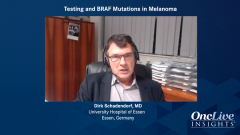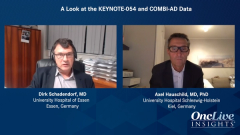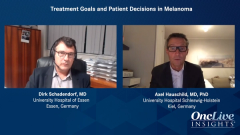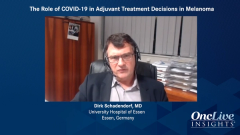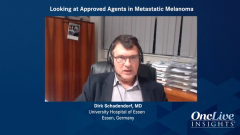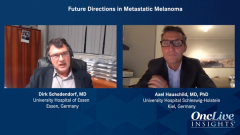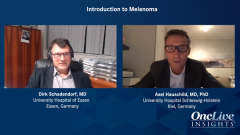
Future Directions in Metastatic Melanoma
Episodes in this series

Axel Hauschild, MD, PhD: Dirk, at the end, we want to discuss the recent releases from ASCO [the American Society of Clinical Oncology annual meeting] 2020. There was a release on lifileucel, an LN-122, adoptive T-cell transfer…dealing with tumor-infiltrating lymphocytes [TILs]. It had a promising response rate of 38%, but I know that at least, in part, you would disagree, in patients who were heavily pretreated with 1 to 9 lines of previous treatment. What is your expectation on the further development of lifileucel?
Dirk Schadendorf, MD: It is an interesting concept that had been proposed nearly 30 years ago by Steven Rosenberg, MD, PhD already.
Axel Hauschild, MD, PhD: It was in 1985 in The New England Journal of Medicine.
Dirk Schadendorf, MD: You see? It has been 35 years now. The concept of using T cells, and we know from the IOs [immune-oncology] that T cells are the critical component of the immune system to control the disease. To infuse TILs in principle, is a good starting point.
On the other hand, one has to say that taking such a mass of tumor out of the body is already a selection. A patient who has survived 7 lines of treatment needs to have a certain biology of the disease to make it to this line of treatment.
There are certain selection biases that drive this response rate. Nevertheless, for those patients who are achieving a complete response that is long lasting, hopefully for years, that is a benefit. Whether this is something that would shift the standard of care, I am still a bit doubtful.
Axel Hauschild, MD, PhD: Dirk, these are excellent responses. My last question is this: what is your expectation for the next positive, statistically significant positive phase 3 clinical trial in the year 2021 or may I say 2021 and 2022? Which drug can make it to the market? Which is the most promising one?
Dirk Schadendorf, MD: After the lesson that it is not so easy to combine different modes of action to improve outcome of our patients, we need to rethink our strategy. That is my personal belief. To think that we have chosen the wrong drug and that we just must take another drug and combine it with PD-1 or whatever will lead to the next breakthrough, I am not very hopeful.
In that sense, I am a bit skeptical about the breakthroughs in 2021 and 2022. We are expecting 2 clinical trial results over the next 2 years. The first is the MASTERKEY-265 trial, which is pembrolizumab plus or minus TVEC [talimogene laherparepvec]. It is whether an injectable is producing a systemic immune response that is even better than what we get with PD-1 monotherapy. It is an interesting question.
The second similar avenue is the bempegaldesleukin study, which is a combination with nivolumab that is in clinical phase 3 testing, which is liposomal encapsulated IL-2 [interleukin-2], which is also a revival introduced by Steven Rosenberg over 30 years-plus back.
Axel Hauschild, MD, PhD: Dirk, I would like to thank you very much, and I will sum up now. The adjuvant treatment of melanoma has completely changed in the last 3 years. We now have very effective anti–PD-1 antibodies in dabrafenib and trametinib as a targeted therapy available for our patients, but all of them are leading to a 50% improvement of relapse-free survival.
Hopefully, all of them will one day show an overall survival improvement as well. This has been shown for dabrafenib/trametinib alone now. For stage IV disease, we heard that there are already some failures, although in the last 10 years, most of the trials have been positive.
Professor Schadendorf was pointing out that he is still hopeful for at least some drugs, and we need to go back to the laboratory if I understand him correctly. We must go back to the bench to find the right concept, not only for combination treatments but eventually for intelligent sequential treatment as well.
With this, I would like to thank you very much for your attention. It was a great pleasure that we could discuss the recent developments in adjuvant and stage IV melanoma treatment with you. I wish all the best for you.
Transcript Edited for Clarity


